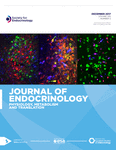Current understanding of metformin effect on the control of hyperglycemia in diabetes
- Hongyiang An and
- Ling He⇑
- H An, Pediatrics, Johns Hopkins School of Medicine, Baltimore, United States
- L He, Pediatrics, Johns Hopkins School of Medicine, Baltimore, 21287, United States
- Correspondence: Ling He, Email: heling{at}jhmi.edu
Abstract
Metformin is a first line oral anti-diabetic agent that has been used clinically to treat patients with type 2 diabetes for over 60 years. Due to its efficacy in therapy and affordable price, metformin is taken by over 150 million people each year. Metformin improves hyperglycemia mainly through the suppression of hepatic gluconeogenesis along with the improvement of insulin signaling. However, its mechanism of action remains partially understood and controversial, especially in regards to the role of AMPK in metformin's action and the mechanism of AMPK activation. In this review, we will discuss recent advances in the understanding of metformin's suppression of hepatic glucose production and the mechanism related to the improvement of insulin signaling.
- Received 20 October 2015
- Received in final form 23 December 2015
- Accepted 6 January 2016
- Accepted Preprint first posted online on 7 January 2016











